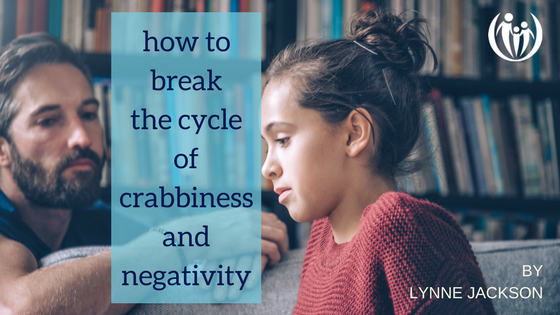
How to Break the Cycle of Crabbiness and Negativity

“I’m bored. No one wants to play with me. I hate my classes and that teacher. I’m no good at anything! Everything is just dumb!”
Sound familiar?
Kids can be pretty good at complaining and crabbing their way to get parents’ attention. And to make matters worse (if you’re anything like I was as a young parent), parents’ well-intended responses often upset kids more, and the snowball of negativity keeps on growing. Like this:
Parent: Be creative. You can find something fun to do.
Child: There’s nothing to do! It’s all boring!
Parent: Don’t be so negative, honey.
Child: There’s nothing to be positive about!
Parent: C’mon, you have good friends.
Child: No I don’t. They all think I’m weird.
If this cycle keeps rolling, parents and kids alike begin to get resentful and cynical. Kids feel ashamed, and assume that parents don’t care about their feelings, and parents grow weary, yet expectant of their kids’ negativity.
To break the cycle, we suggest using the four powerful “Discipline that Connects” messages to give practical guidance:
1. “You are SAFE with me”
If we get crabby when kids get crabby, we don’t feel very safe to them – now they have to deal with their negative feelings AND ours. And they learn in a strange sort of way that they can manipulate and control our emotions by staying crabby. The first key to staying safe is to figure out how to be OK when your child is not. We coach parents to picture a bubble around their child, filled with that child’s emotions. And then to visualize that parents have their own bubble and are only responsible for the emotions in that bubble. One parent stated, “It was so much easier when I let go of needing to manage everyone’s emotions!”
Find ways to stay calm and neutral when your kids are crabby. Put on some music. Take a break to do whatever helps you stay in your “peaceful place.” This will keep your mind and spirit clear to more effectively guide your child.
2. “You are LOVED!”
Sometimes irritable children can feel like they don’t deserve love, so they act out to get negative attention that matches their mood. Take a little time to speak and show your unconditional love for your child. Simply empathize; voice and validate the child’s feelings. It helps them know you understand and are for them, not against them.
3. “You are GOD’S WORKMANSHIP, called and capable!”
Instead of doling out suggestions, express confidence that your child can identify their options (see examples below.) This can help them calm their bodies and minds and allow them to think more clearly. Over time this will build an identity as a problem-solver rather than as a helpless complainer.
4. “You are RESPONSIBLE!”
Focusing on this important message teaches kids that they are responsible for their own emotions and actions, not you. And, as a parent, you will be less focused on making the behavior stop and more focused on equipping your child.
Sounds great, right? But what does this look like on a day to day basis:
- Empathize: “Yeah, it’s got to be really frustrating that we’ve had so many games canceled this spring! You were really looking forward to today. I feel frustrated too when things I’m excited about get canceled.”
- Set them up to find a solution themselves: “What ideas do you have so that we can work together to make this day better? I’m going to start making lunch. Why don’t you think about your options, and when we’re eating, we could talk about them if you’d like. I’m sure you’ll come up with something that’s an okay second best – I’ve seen you do that before.”
- Love, no matter what: “If you can’t come up with anything to make this day better, you know you don’t have to be cheerful for me to love you, right?”
These aren’t “tricks” to bring temporary peace from grumbling. You can remind yourself when you’re tempted to be irritated that it’s a powerful thing to bring grace to your child’s negativity. How we respond to our kids’ crabbiness can represent the God (Psalm 103) who handles our difficult moods with loving, empowering guidance.
Sign up below to receive a weekly dose of encouragement straight to your inbox:






